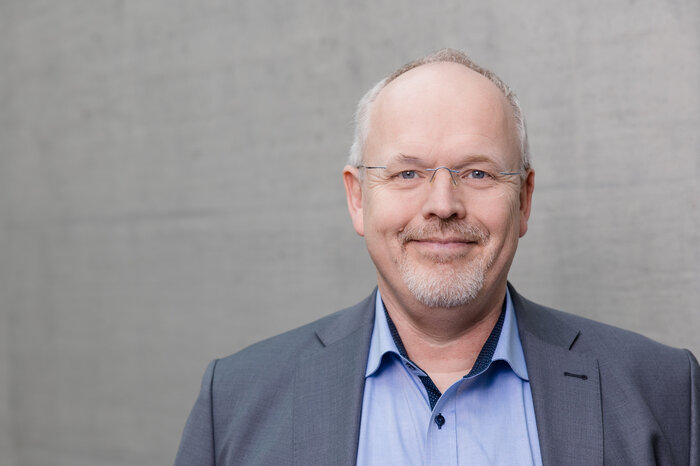Department of Engineering and Technology
As a competence center for innovative and application-oriented technology, the Department of Engineering and Technology links academic teaching and inter-company research with companies and institutions in the region.
In this way, the Department of Engineering and Technology contributes to strengthening the innovative power, employer attractiveness and competitiveness of companies in Vorarlberg.
The focus is on Electrical Engineering, Mechatronics, Computer Science and Energy Systems and Environmental Engineering.
The department's teaching responsibilities include, in particular:
- Developing, directing and advancing technically oriented degree programmes and courses
- Delivering courses with technical and selected techno-economic course contents
- Training of technical specialists and managers for companies and institutions in the region
The Department of Engineering and Technology is the FHV's largest and most capable department, with over 65 people - 41 of whom are professors/lecturers - from a wide range of disciplines. They cover a wide range of subject areas in 10 degree programmes, both professionally and in research.
In this way, the Department of Engineering and Technology contributes to strengthening the innovative power, employer attractiveness and competitiveness of companies in Vorarlberg.
As a competence center for innovative and application-oriented technology, the Department of Engineering and Technology links academic teaching and inter-company research with companies and institutions in the region.
The focus is on:
-
Computer Science
-
Electrical Engineering
-
Mechatronics
-
Energy Systems and Environmental Engineering
-
Data & Processes
This is reflected in the following competence areas:
Competence area Data & Processes
The competence area Data & Processes plays an important role in both research and teaching.
Research and teaching are closely intertwined, allowing current research results to be incorporated into teaching and equipping students with the latest knowledge and methods.
The development of new methods and technologies, as well as the teaching of skills and knowledge in the field of digital innovation and transformation processes, are crucial to successfully meeting the challenges of a data-driven world.
Mission Statement:
Our mission is to help organizations optimize their business processes and promote sustainability through the effective use of data and technology. We are committed to helping our customers benefit from the latest developments in data analytics, process optimization and automation to improve their decision-making and efficiency.
Competence area Industrial & Sustainable Engineering
The competence area of Industrial & Sustainable Engineering occupies a central role in the educational landscape in the areas of research and teaching. A diverse range of high-quality teaching ensures well-founded education and continuing education in order to master the societal challenges of the future.
In the competence area, experts deal with the topics of resource conservation, renewable Energy and sustainability. The goal is to develop solutions to reduce environmental impact and ensure a sustainable energy supply.
Mission Statement:
Our competence area Industrial & Sustainable Engineering strives to be a leader in the sustainable development of the environment and energy sector. We are committed to developing innovative and effective solutions that help reduce greenhouse gas emissions and protect natural resources. By working closely with businesses and civil society, we strive to bring about positive change. We are committed to leveraging our expertise and ability to collaborate to accelerate the transition to a more sustainable future and preserve a livable environment for future generations.
Competence area Software Engineering
Experts in the competence area Software Engineering deal with a variety of topics related to software engineering, such as programming languages, algorithms and data structures, software testing and quality assurance, software architecture and design patterns, software project management, and human-computer interaction.
The Software Engineering competence area team consists of experienced software engineers and researchers with degrees in Computer Science or related fields. Research takes place in the areas of software engineering education, software development processes, software security, and reliability.
Students are exposed to various software development methodologies and encouraged to apply them to their projects. Overall, the Informatics competence area provides students in all technical degree programmes with a solid foundation in the principles of software engineering and prepares them for a successful career in the software industry or for further academic studies.
Mission Statement:
Our competence area aims to provide an excellent academic education in the principles and techniques of software engineering and design. We strive to provide students with a solid foundation in the theory and practice of software engineering and to prepare them for successful careers in the software industry or for further academic study. We strive to contribute to the advancement of software engineering and promote the progress of society through innovative research and partnerships with industry and the community.
Competence area Smart Engineering
The competence area Smart Engineering combines the technical engineering sciences such as Mechanical Engineering, Mechatronics, Electrical Engineering, Electronics, Robotics.
These competencies provide qualified future-oriented teaching for technical degree programmes at Bachelor and Master level. We train the engineers of tomorrow so that they can develop the technologies of the day after tomorrow. To this end, we research technological solutions of the future in the "Smart Engineering Technologies" group; this takes place in close cooperation with the research centres of the FHV, the technology companies in the region and with our academic partners throughout Europe.
Mission Statement:
Our competence area Smart Engineering trains engineers at the highest level and conducts research on the technologies of the future. The combination of teaching and research provides society with the people and technologies to solve and master current and future challenges in various technical fields.
Department of Engineering and Technology
The department's teaching responsibilities include, in particular:
-
Development, management and advancement of technically oriented degree programmes and study programs
-
Delivering courses with technical and selected techno-economic course contents
-
Training of technical specialists and managers for companies and institutions in the region
Department of Engineering and Technology
In cooperation with the research centres of the FH Vorarlberg we work together on research projects. The research mostly takes place in the context of externally funded projects and is carried out in interdisciplinary teams.
A particularly intensive connection exists with the research centres Energy, Microtechnology, Business Informatics, Digital Transformation and Human-centred Technologies. Insights gained flow directly into the lectures.
Research Interests:
-
Human Machine Interface
-
Virtual Reality
-
Simulation/Modeling/Processes
-
Real Time Embedded Systems
-
Industrial Electronics, Measurement
-
Robotics, control engineering, image processing
-
Sustainable Energy Systems and Energy Materials
-
Autonomous decentralized energy systems
-
Digital transformation
Project Partners Department of Engineering and Technology
1zu1 Prototypen GmbH, Dornbirn
2XM Millner & Millner ZT GmbH
Astrium GmbH, Friedrichshafen (D)
Bachmann electronic GmbH, Feldkirch
Julius Blum GmbH, Höchst
BMW AG, Munich (D)
Carnegie Mellon University
The Robotics Institute, Tissue Engineering Lab, Pittsburgh, PA (USA)
German Aerospace Center (DLR), Weßling (D)
Doppelmayr Seilbahnen GmbH, Wolfurt
ESCATEC Switzerland AG, Heerbrugg (CH)
ETH Zurich, Zurich (CH)
Head Sport AG, Kennelbach
HighQLaser Production, Hohenems
HILTI Aktiengesellschaft, Schaan (FL)
gbd LAB GmbH, Dornbirn
Kuka Roboter GmbH, Augsburg (D)
Kunststoffwerk AG Buchs, Buchs (CH)
Leica Geosystems AG, Heerbrugg (CH)
Liebherr-Werk Nenzing GmbH, Nenzing
Omicron Electronics GmbH, Klaus
precisa CNC Werkzeugmaschinen GmbH, Vienna
Soplar S.A., Altstätten (CH)
Stanford University
The Rapid Prototyping Lab, Palo Alto, CA (USA)
SwissOptic AG, Heerbrugg (CH)
technoplus Verarbeitungstechnik GmbH, Lauterach
Tecnotron Elektronik, Weißenberg (D)
Thien eDrives GmbH
TridonicAtco GmbH & Co KG, Dornbirn
Unaxis Balzers AG, Balzers (FL)
Westcam, Mils
Witzemann + Fritz GmbH, Lustenau
ZF Friedrichshafen AG, Friedrichshafen (D)
Zumtobel Lighting GmbH, Dornbirn
z-werkzeugbau GmbH, Dornbirn
Services
The Department of Engineering and Technology's laboratories are equipped with state-of-the-art technologies, which allows us to offer a wide range of services and investigations:
-
Vibration measurement on machines
-
Machine tool diagnostics
-
3D coordinate metrology
-
Measurement of free-form surfaces
-
Tensile, compression testing
-
Hardness test
-
Toughness examination by pendulum impact
-
Material analysis by spark spectrometer
Infrastructure in the Department of Engineering and Technology
A major concern of the Department of Engineering and Technology is to be hands-on. To this end, four laboratories are available to the various disciplines:
-
Automation Lab
-
Design Lab
-
Electronic Lab
-
Mechanical Lab
As well as the infrastructure of the Smart Engineering Technologies research groups.
In these laboratories, students receive hands-on training on the one hand, and theses that have emerged from research questions are experimentally proven on the other.






